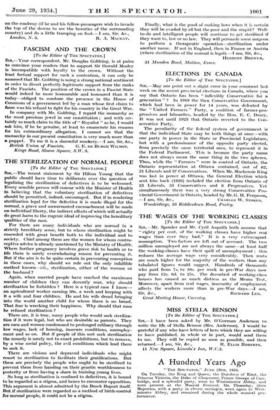THE STERILIZATION OF NORMAL PEOPLE
[To the Editor of THE SPECTATOR.]
SIR,—The recent statement by Sir Hilton Young that the public should have time to deliberate over the question of legalizing the sterilization of defectives is to be welcomed. Every sensible person will concur with the Minister of Health in believing that the voluntary sterilization of defectives should be permitted, indeed, encouraged. But if in rendering sterilization legal for the defective it is made illegal for the normal, a grave and unwarranted encroachment will be made on individual liberty, the indirect effects of which will actually do great harm to the eugenic ideal of improving the hereditary qualities of the race.
For there are many individuals who are normal in a strictly hereditary sense, but to whom sterilization might be conceded with great benefit both to the individual and to society. Chief among them are the women for whom contra- ceptive advice is already sanctioned by the Ministry of Health. Where further pregnancy involves grave risk to health or to life there is surely overwhelming reason for preventing it. But if the aim is to be quite certain in preventing conception in these cases, why should we rule out the only infallible method known—viz., sterilization, either of the woman or the husband ?
Again, when married people have reached the maximum number of children they can decently rear, why should sterilization be forbidden ? Here is a typical case I know--- an agricultural worker earning 30s. a week and keeping with it a wife and four children. He and his wife dread bringing into the world another child for whom there is no bread. That fear is wrecking their happiness. Why should that man be refused sterilization ?
There are, it is true, many people who would seek steriliza- tion if it were legal, but who are desirable as parents. They are men and women condemned to prolonged celibacy through low wages, lack of housing, insecure conditions, unemploy- ment and so on. But if people of this sort seek sterilization the remedy is surely not to enact prohibitions, but to remove, by a wise social policy, the evil conditions which lead them to seek it.
There are vicious and depraved individuals who might resort to sterilization to facilitate their gratifications. But these are precisely the people who ought to be sterilized to prevent them from handing on their genetic worthlessness to posterity or from having a share in training young lives.
So long as sterilization is confined to defectives, it is bound to be regarded as a stigma, and hence to encounter opposition. This argument is almost admitted by the Brock Report itself. But if sterilization were regarded as a method of birth-control for normal people, it could not be a stigma. Finally, what is the good of making laws when it is certain they will be evaded by all but the poor and the stupid? Wen- to-do and intelligent people will continue to get sterilized if they want to, law or no law. They will persuade some surgeon to perform a therapeutic operation—sterilization under another name. If not in England, then in France or Austria (where sterilization of the normal is legal).—I am, Sir, &c., HERBERT BREWER. 31 Mundon Road, Maldon, Essex.




































 Previous page
Previous page